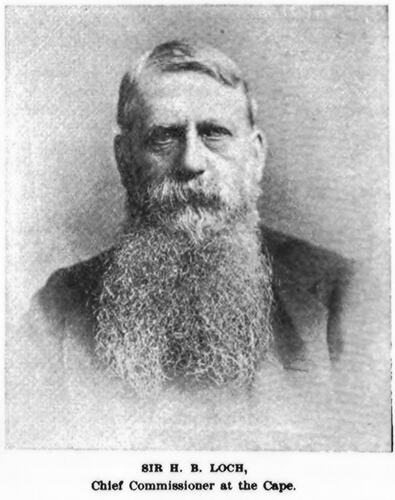Sir Henry Brougham Loch, Governor of Victoria, was born in Edinburgh, Scotland, in 1827. At the age of 13 he began service as a mid-shipman in the navy, continuing until he was 15; at 17 he was commissioned in the Bengal cavalry and was ADC to Lord Gough in the Sutlej campaign in 1845. Loch was sufficiently capable to organise irregular Turkish cavalry in the Crimean War, and in 1857-58 accompanied Lord Elgin's mission to China. He impressed Elgin, and in 1860 returned to China with Elgin as his private secretary. He negotiated the surrender of the Taku ports on the way to Beijing, but was captured and endured ill-treatment.
On his release and return to England, Loch decided to resign from the army, and became Private Secretary to the Home Secretary. In 1863, at the age of 36, he married the well-connected Elizabeth Villiers. In 1863 he was appointed Lieut-governor of the Isle of Man, a post he held for 19 years. On 15 July 1884 he was appointed Governor of Victoria. He was considered Victoria's most popular and respected governor.
Like other governors, Loch had little to do with political affairs; the appointment of an agent-general to communicate with London meant that he had little access to confidential information and could only write superficial reports. He was active, however, in his discussions with Britain on naval affairs and Chinese immigration, although his influence on policy was slight. He was socially successful as a Governor, and his wife was an active philanthropist who in 1887 helped to organise the Queen's Jubilee fund for the 'relief of suffering womankind'.
Loch was patron of the 1888 Melbourne Centennial International Exhibition and officially performed the opening, for which he was presented a medal [NU 16453] . The following year he went on leave to England, and was appointed High Commissioner for South Africa and Governor of Cape Colony. He returned briefly to Melbourne and resigned as governor on 15 November 1889. On his return to England Loch was created baron. He sat with the Liberal Unionists in the House of Lords.
Loch died on 20 June 1900, aged 73. He was survived by his wife, son and two daughters.
More Information
-
Keywords
-
Localities
-
Authors
-
Article types
